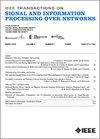Probability-Constrained Distributed Non-Fragile Estimation Over Sensor Networks Subject to Stochastic Communication Protocol
IF 3
3区 计算机科学
Q2 ENGINEERING, ELECTRICAL & ELECTRONIC
IEEE Transactions on Signal and Information Processing over Networks
Pub Date : 2025-07-24
DOI:10.1109/TSIPN.2025.3592332
引用次数: 0
Abstract
This article focuses on the probability-constrained distributed non-fragile (PDNF) estimation problem for nonlinear time-varying systems with unknown but bounded noises, sensor saturation and uniform quantization over sensor networks (SNs). Owing to the limited bandwidth resources, stochastic communication protocol (SCP) is employed to manage network transmission and prevent data collision. At each transmission instant, the sensor node is allowed to communicate with only one randomly selected neighboring sensor. Meanwhile, the non-fragility of the estimator is taken into account to handle potential parameter variations. The goal of this article is to develop a PDNF estimation algorithm such that 1) the estimation error is confined within a certain ellipsoidal region with a predefined probability; and 2) the resulting error ellipsoid is minimized in the sense of matrix trace to achieve optimal estimation performance. In light of this, the sufficient criteria for the availability of the estimator are derived through recursive linear matrix inequality (RLMI) technique. Furthermore, the optimal estimator parameters are attained by solving a convex optimization problem. Ultimately, two simulation experiments are presented to validate the feasibility and practicality of the designed estimation algorithm.随机通信协议下传感器网络的概率约束分布式非脆性估计
本文研究了具有未知有界噪声、传感器饱和和均匀量化的非线性时变系统的概率约束分布非脆性估计问题。由于带宽资源有限,采用随机通信协议(SCP)来管理网络传输和防止数据冲突。在每个传输时刻,传感器节点只允许与随机选择的一个相邻传感器通信。同时,考虑了估计器的非脆弱性,以处理潜在的参数变化。本文的目标是开发一种PDNF估计算法,使1)估计误差以预定义的概率限制在一定的椭球区域内;2)在矩阵跟踪意义上最小化得到的误差椭球,以达到最优的估计性能。在此基础上,利用递归线性矩阵不等式(RLMI)技术推导了估计量可用性的充分准则。此外,通过求解一个凸优化问题得到了最优估计器参数。最后,通过两个仿真实验验证了所设计估计算法的可行性和实用性。
本文章由计算机程序翻译,如有差异,请以英文原文为准。
求助全文
约1分钟内获得全文
求助全文
来源期刊

IEEE Transactions on Signal and Information Processing over Networks
Computer Science-Computer Networks and Communications
CiteScore
5.80
自引率
12.50%
发文量
56
期刊介绍:
The IEEE Transactions on Signal and Information Processing over Networks publishes high-quality papers that extend the classical notions of processing of signals defined over vector spaces (e.g. time and space) to processing of signals and information (data) defined over networks, potentially dynamically varying. In signal processing over networks, the topology of the network may define structural relationships in the data, or may constrain processing of the data. Topics include distributed algorithms for filtering, detection, estimation, adaptation and learning, model selection, data fusion, and diffusion or evolution of information over such networks, and applications of distributed signal processing.
 求助内容:
求助内容: 应助结果提醒方式:
应助结果提醒方式:


